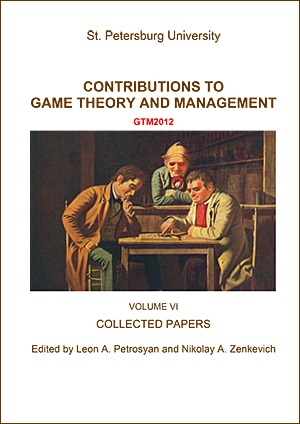Differential Bargaining Games as Microfoundations for Production Function
Abstract
In the present paper the game theory is applied to an important open question in economics: providing microfoundations for often-used types of production function. Simple differential games of bargaining are proposed to model a behavior of workers and capital-owners in processes of formation of possible factor prices and participants' weights (moral-ethical assessments). These games result, correspondingly, in a factor price curve and a weight curve – structures dual to a production function. Ultimately, under constant bargaining powers of the participants, the Cobb-Douglas form of the production function is received.
Keywords:
bargaining, differential games, production factors, choice of technology, duality, production function
Downloads
References
Acemoglu, D. (2003). Labor- and Capital Augmenting Technical Change. Journal of the European Economic Association, 1, 1–37.
Blainey, G. (1988). The Causes of War. New York: The Free Press.
Cornes, R. (1992). Duality and Modern Economics. Cambridge: Cambridge University Press.
Dupuy, A. (2012). A Microfoundation for Production Functions: Assignment of Heterogeneous Workers to Heterogeneous Jobs. Economica, 79, 534–556.
Jones, C. J. (2005). The Shape of Production Function and the Direction of Technical Change. Quarterly Journal of Economics, 120, 517–549.
Lagos, R. (2006). A Model of TFP. Review of Economic Studies, 73, 983–1007.
Matveenko, V. (2997). On a Dual Representation of CRS Functions by Use of Leontief Functions. Proceedings of the First International Conference on Mathematical Economics, Non-Smooth Analysis, and Informatics. Baku, Azerbaijan: Institute of Mathematics, 160–165.
Matveenko, V. (2010). Anatomy of Production Functions: a Technological Menu and a Choice of the Best Technology. Economics Bulletin, 30, 1906–1913.
Muthoo, A. (1999). Bargaining Theory with Applications. Cambridge: Cambridge University Press.
Nakamura, H. (2009). Micro-Foundation for a Constant Elasticity of Substitution Production Function Through Mechanization. Journal of Macroeconomics, 31, 464–472.
Nash, J. F. (1950). The Bargaining Problem. Econometrica, 18, 155-162.
Roth, A. E. (1979). Axiomatic Models of Bargaining. Berlin: Springer-Verlag.
Rubinov, A. M. (2000). Abstract Convexity and Global Optimization. Dordreht: Kluwer.
Rubinov, A. M., Glover, B. M. (1998). Duality for Increasing Positively Homogeneous Functions and Normal Sets. Operations Research, 12, 105–123.
Schelling, T. C. (1956). An Essay on Bargaining. American Economic Review, 16, 281–306.
Serrano, R. (2008). Bargaining. S.Durlauf and D.Blume (Eds.) New Palgrave Dictionary of Economics. 2nd ed. V. 1. London: McMillan, 370–380.
Thomson, W. (1994). Cooperative Models of Bargaining. R.T.Aumann and S.Hart (Eds.) Handbook of Game Theory. New York: North-Holland, 1237–1248.
Downloads
Published
How to Cite
Issue
Section
License
Articles of "Contributions to Game Theory and Management" are open access distributed under the terms of the License Agreement with Saint Petersburg State University, which permits to the authors unrestricted distribution and self-archiving free of charge.




